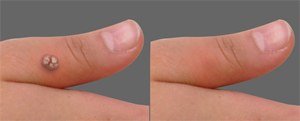Squaric Acid Therapy for Warts

Squaric acid dibutyl ester, commonly called squaric acid, is used to treat warts in children. Squaric acid is a very dilute liquid that causes a mild allergic reaction in the skin. Warts are skin infections caused by a virus called human papilloma virus (HPV). They are usually skin colored, rough to touch and usually grow on the fingers, nails, back of the hands and soles of the feet.
Indications
Squaric acid therapy is mainly used in children who present with warts. It can also be used to treat alopecia areata, a form of hair loss. Squaric acid therapy has been shown to help many warts to resolve.
Technique
To start the treatment the patient must first be sensitized to the solution. This is done by applying a small amount of 2% squaric acid on the inside of the right upper arm. This often causes no reaction, although occasionally there may be mild redness of the skin. If no reaction occurs, it does not mean that it is not working properly. The first treatment with the squaric acid will be given in the office after two weeks. Then your doctor will instruct you to apply the solution on the warts at home.
It is advised to wear gloves while applying squaric acid. A Q-tip is used to apply the solution directly on to the warts. The squaric acid evaporates leaving no residue. Initially it is applied 3 times a week preferably at night. After the first week the frequency is increased to 4 nights a week then to 5 nights a week. Do not increase the frequency if your child experiences itching or soreness at the application sites. The main aim of the treatment is to have mild redness for the medicine to work and get rid of the warts. The medicine should be kept out of reach of children.
Adverse effects
Adverse effects include tiny blisters, redness, scaling, pustules and broken skin. If any of these effects occur stop the therapy immediately and consult your dermatologist. Irritation and dermatitis may occur at the site of sensitization.
Contraindications
Not to be used in pregnant women, as the allergic reaction provoked may harm the fetus. The treatment takes time, sometimes weeks to several months, before results are seen. Squaric acid therapy does not work in all patients; in such cases other alternative treatments will be discussed.
Schedule your consultation with Dr. Resnik
